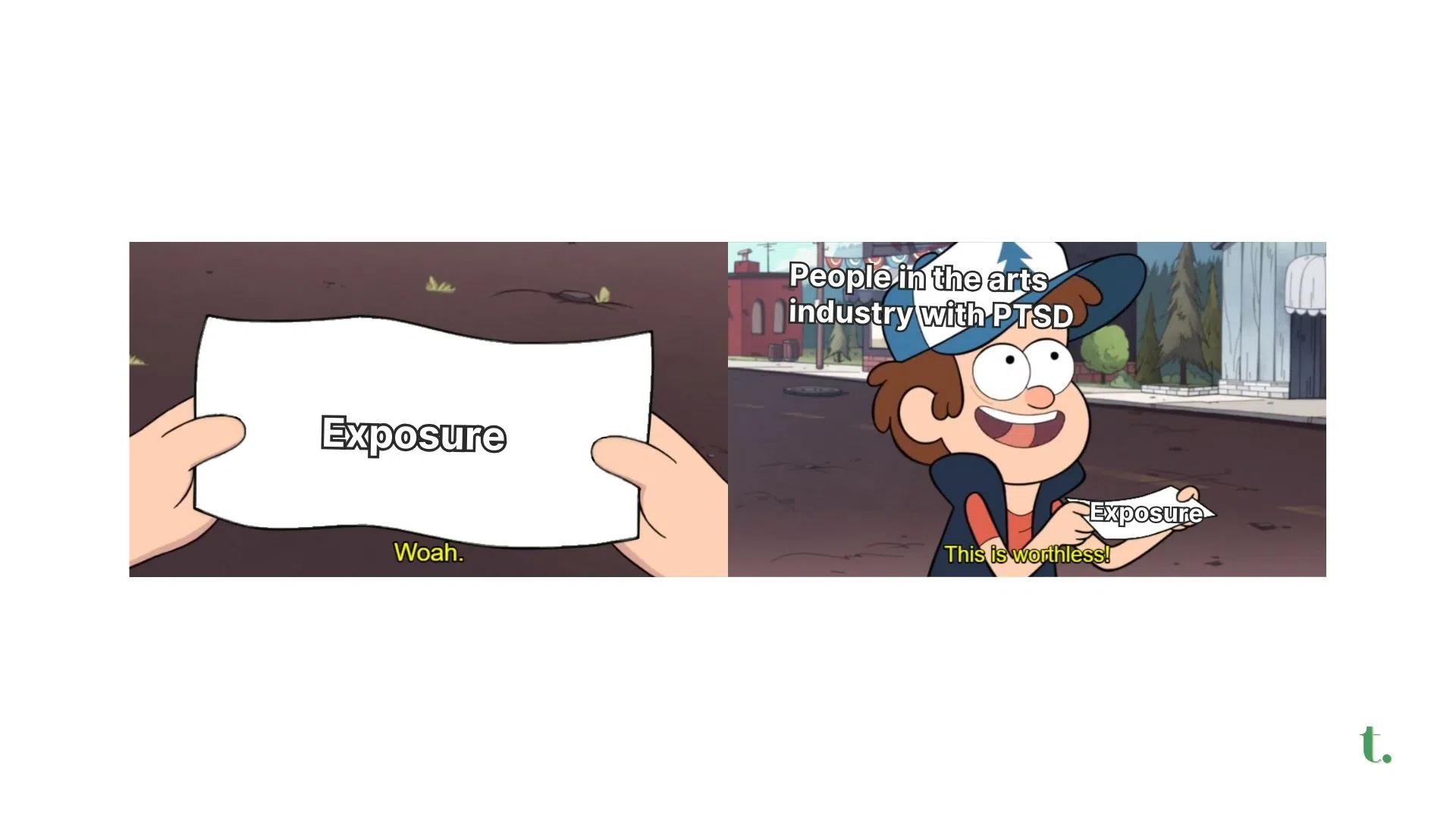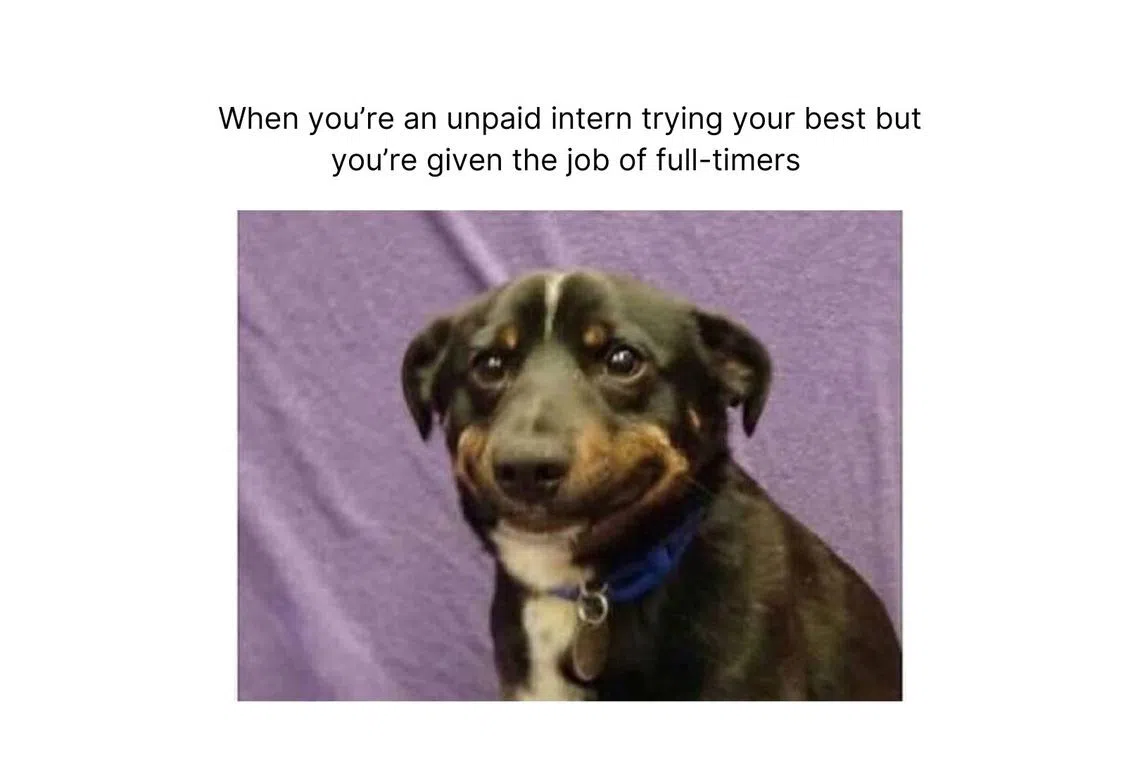🥺 Should you take up an unpaid internship?

Straight to your inbox. Money, career and life hacks to help young adults stay ahead.
[SINGAPORE] In a recent media interview, Manpower Minister Tan See Leng urged undergraduates to put themselves out there and gain real-world experience to improve their employability.
He flagged how “skills-based hiring” is the latest trend among employers these days. This describes how companies are focusing on skills over qualifications when it comes to hiring decisions.
“My advice to all young undergraduates: Don’t think about what kind of stipend or pay that’s going to come (during your internship),” Dr Tan had said.
“Get that exposure, because you need to really put yourself, your name, your face, out there. I think it would make (your) selection (of a job) a lot easier.”
Before the pitchforks start coming out about how one can’t pay the bills with “exposure”, it might be helpful to take a step back to look at what’s happening globally.
Around the world, jobs labelled “entry-level” seem to be slowly disappearing or getting harder to access, with some ironically requiring years of experience.
Navigate Asia in
a new global order
Get the insights delivered to your inbox.
While artificial intelligence (AI) has been thrown about loosely as the scapegoat for this trend, it is clear that it has impacted jobs traditionally done by entry-level workers.

One US study found that more than one-third of employers would rather have AI do the job of a fresh graduate. Some of their biggest gripes with Gen Zs are their lack of real-world experience, being expensive to train and not having the right skillsets.
The recent tariff turmoil (likely to hit economies and jobs) has added to this mix and spells trouble for a generation of struggling Gen Zs. Entry-level jobs were once meant to be the starting point on one’s career ladder, but now, even the first rungs are getting harder to reach. What’s a fresh grad to do?
⚖️ What’s the opportunity cost?
Against this backdrop, the manpower minister is not wrong that real-world experience will certainly help fresh grads get their foot in the door, especially when competition is stiff.
In an ideal world, companies should compensate interns fairly and give them the experience and exposure needed to add to their portfolio. Fortunately, a quick scan of job portals shows that most internships in Singapore, especially those targeting undergrads, are paid.
But the reality is that there are still some unpaid or low-paying internships out there, with no law in Singapore indicating that there should be a minimum stipulated allowance (although employers are “encouraged” to provide monthly stipends to defray the food and travelling expenses). So, with more entry-level jobs requiring applicants to have some form of work experience, undergrads will likely feel pressure to take up such internships.

Unpaid or low-paying internships disadvantage those who can’t afford them. Not everyone has the privilege of depending on daddy’s money to make ends meet for a few months. So, should you reject such positions outright as a matter of principle?
My take is that such a decision should be made based on one’s hierarchy of needs – if you need to make ends meet, there is no shame in declining. If finances permit and the internship is one you can learn from in a field you wish to enter, I would say go for it. This is especially so if such companies explicitly state the training and mentorship interns will receive in exchange. (To be clear, most reputable companies will certainly pay a stipend.)
Another instance that I can imagine accepting an unpaid internship is if the company has not advertised any internship openings, but is willing to accept me when I write to them to ask for an opportunity. This indicates that the company doesn’t need an intern, but is willing to give me a chance.
However, if it’s for a no-name company that is not upfront about your job scope or what you’ll learn, and is part of an industry where unpaid internships are not the norm, then it’s more likely that you will be regarded as free labour. If this is not even in a field you’re keen on, I might think twice.

But like I said, it all comes down to trade-offs and opportunity costs. If 1) you can afford it; 2) can’t land any other job or internship; and 3) will end up wasting your mid-year break, I’d say go for it, as you have nothing to lose. Who knows, you might learn a thing or two.
🧮 Making it count
The (paid) interns at thrive like to remind me that I belong to the dinosaur era, where one could land a job even without ever having done an internship. To be fair, I may not have done internships, but this dinosaur had to hustle for temp jobs every school break for pocket money.
Arranging files, data entry work and customer service might not be the most glamorous, but the experiences did go some way to prepare me for the working world.
And interestingly enough, my hiring manager back then told me that they took me in because I seemed adaptable as I’ve tried all kinds of summer jobs, even if it’s not directly linked to that industry.
So, if you find yourself in an unfortunate situation with a poorly paid internship, here are some tips:
Still show up. I don’t mean just physically, but do your best in your internship, even if it’s not paid. You shouldn’t break your back for the company, but recognise that your performance could potentially lead to paid opportunities in the future. Or at least it could help you build your reputation, as industry circles are smaller than you think.
Seize opportunities to network. An internship in the field you want gives you an in. Don’t just talk to immediate colleagues; try to network and meet others in the workplace.
Learn as much as you can. An internship, paid or not, is the best opportunity for you to learn. Seniors won’t expect you to know everything, which makes it the best time to absorb what you can and ask questions to build your skills. You’ll learn things about the career that your university may not teach you.
Communicate your needs. Sometimes, employers are bogged down with so many day-to-day responsibilities that they may not realise you might not be well-engaged in your internship. The onus is on you to speak up when appropriate to ask for things you can help with or suggest contributions to the team. Your managers will be thrilled, I guarantee.
Set goals. Again, if you’re not paid, there’s even more impetus for you to gain something from this internship. Having a goal, for instance, growing in certain areas, will keep you motivated and accountable.
Ask for a recommendation. If you’ve performed well, ask your manager for a recommendation. This may help you get employment elsewhere.
No one can decide for you if an unpaid internship is worth it. But if you’re out of options, I suggest that you make the most out of the temporary situation, even if it feels crappy. Just think of it as a stepping stone to better things. The worst case scenario (I’m talking real exploitation, toxic environment and zero learning opportunities) is that you quit – I mean, what are they going to do? Not pay you?
TL;DR
- Skills-based hiring is the biggest trend among employers these days
- Unpaid internships disadvantage those who can’t afford them
- While they are not ideal, they might still be worthwhile if training and mentorship are provided
- Make the most of your internship, as it might open doors in the future
thrive is the young audience initiative of The Business Times. Sign up for thrive’s weekly newsletter here. Follow on TikTok and Instagram for regular updates.
Decoding Asia newsletter: your guide to navigating Asia in a new global order. Sign up here to get Decoding Asia newsletter. Delivered to your inbox. Free.
Copyright SPH Media. All rights reserved.


